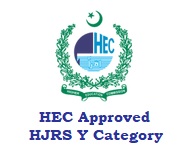The Concept of Fair Trial in Pakistan: A Comprehensive Examination of Implementation and Global Recognition
Keywords:
Right to fair trial, constitution of Pakistan, implementationAbstract
The right to a fair trial is a fundamental pillar of justice, embodying principles of due process, impartiality, and transparency. In the context of Pakistan, this study offers a rigorous exploration of the practical implementation of fair trial rights within the country's legal framework. It also investigates the international recognition and acceptance of Pakistan's efforts in upholding these rights. This comprehensive examination delves into the challenges, successes, and shortcomings faced by the Pakistani legal system in ensuring a fair trial for its citizens. It scrutinizes the various legal mechanisms, precedents, and institutional structures that influence the realization of these rights. Furthermore, the article assesses Pakistan's compliance with international standards and the degree to which its fair trial practices are acknowledged on the global stage. It sheds light on the country's commitments under international human rights conventions and scrutinizes the perceived alignment with these commitments. The findings of this research reveal the complexities inherent in the implementation of fair trial rights in Pakistan, providing insights for policymakers, legal practitioners, and human rights advocates. Moreover, it offers a valuable perspective on the global recognition and evaluation of Pakistan's endeavors in safeguarding the right to a fair trial. In sum, this study contributes to the ongoing discourse on human rights and justice in Pakistan by offering a comprehensive analysis of the practical implications and international dimensions of the right to a fair trial within the country's legal landscape. The qualitative research methodology has been applied in the following article.
Downloads
References
Faisal, S. M., Usman, M., & Khan, A. (2023). Unraveling the Constitutional Quandry: The Status of FATA Pre-Merger in the 1973 Constitution. Pakistan JL Analysis & Wisdom, 2, 591.
Hussain, N., Khan, A., & Chandio, L. A. (2023). Legal Safeguards against Mob Justice: An Analysis of Blasphemy Laws in Pakistan and International Human Rights Norms. Al-Qamar, 13-26.
Iqbal, M., & Iqbal, K. (2020). Shariah and Evolution of fair Trial Rights in Pakistan. Rahat-ul-Quloob, 130-141.
Javed, K., Jianxin, L., & Khan, A. (2021). Constitutional exceptions of right to speech: Evidence from the apex courts of Pakistan. Journal of Humanities, Social and Management Sciences (JHSMS), 2(1), 72-84.
Kanwel, S., KHAN, M. I., Usman, M., & Khan, A. (2020). Navigating Constitutional Challenges: An In-depth Exploration of Pakistan's Constitutional Landscape. International Review of Social Sciences (IRSS), 8(11), 273-279.
Kanwel, S., Yasmin, T., & Usman, M. (2023). Crime and Human Rights in Pakistan: An Analysis in Light of International Law. Traditional Journal of Law and Social Sciences, 2(02), 71-81.
Khan, A. S., Bibi, A., Khan, A., & Ahmad, I. (2023). Responsibility of Sexual Violence Under International Law. Journal of Social Sciences Review, 3(1), 29-41.
Khan, A., Iqbal, N., & Ahmad, I. (2022). Human Trafficking in Pakistan: A Qualitative Analysis. Journal of Social Sciences Review, 2(3), 257-268.
Khan, A., Javed, K., Khan, A. S., & Rizwi, A. (2022). Aggression and individual criminal responsibility in the perspective of Islamic law. Competitive Social Science Research Journal, 3(1), 35-48.
Khan, M. I., & Riaz, N. (2024). Blasphemy Laws in Pakistan: A Legal Analysis and Contemporary Discourse. International Journal of Social Science Archives (IJSSA), 7(1), 67-71.
Qayum, S., & Ahmad, H. (2022). The Right of an Accused to a Fair Trial in Criminal Administration of Justice: Testing the Fairness of a Murder Trial in Sessions Court in District Shangla of Khyber Pakhtunkhwa. Pakistan Journal of Criminology, 14(3), 101-114.
Rafiq, W., Baig, K., Rana, F. A., & Safdar, M. A. (2022). Conceptualization Of Legal Aid Under Right To Fair Trial In Pakistan. PalArch's Journal of Archaeology of Egypt/Egyptology, 19(3), 1525-1540.
Riaz, N., & Usman, M. (2024). Blasphemy Laws in Contemporary Legal Systems. International Journal Of Human And Society, 4(1), 164-171.
Shah, N. A. (2016). The Right to a Fair Trial and the Military Justice System in Pakistan. Journal of International Humanitarian Legal Studies, 7(2), 330-362.
Shaikh, K. (2022). The Right to Fair Trial in Pakistan: An Analysis of its Implementation and International Recognition. Available at SSRN 4526164.
Usman, M., Kanwel, S., Khan, M. I., & Khan, A. (2021). Advancing Gender Equality within the Legal Framework of Pakistan: Navigating Progress and Overcoming Persistent Challenges. International Review of Social Sciences (IRSS), 9(5), 310-316.
Downloads
Published
License
Copyright (c) 2024 the Authors

This work is licensed under a Creative Commons Attribution-NonCommercial 4.0 International License.






